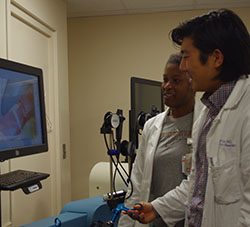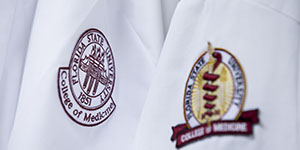Educational Goals
Program Goals and Objectives
The program curriculum is designed to provide residents with a comprehensive clinical experience with progressive advancement to the ultimate goal of independent practice in general surgery. Critical to the resident’s progressive advancement is the development of effective self-directed study and mastery of the clinical and basic science of general surgery. Residents are expected to demonstrate the skills, knowledge, and attitudes to sufficiently meet the requirements of the following ACGME General Competencies; Patient Care, Medical Knowledge, Practice-Based Learning and Improvement, Interpersonal and Communication Skills, System-Based Practice and Professionalism.
Program Educational Goals
 1. Provide a fundamental knowledge base in the basic sciences applicable to general surgery.
1. Provide a fundamental knowledge base in the basic sciences applicable to general surgery.
2. Provide complex and diverse clinical learning opportunities in general surgery.
3. Provide learning opportunities through simulation and clinical practice so the resident may develop technical proficiency to execute the majority of general surgery procedures.
4. Provide sufficient non-operative clinical learning opportunities so the resident may develop excellent clinical decision-making capabilities.
5. Provide clinical learning opportunities that will allow the resident to develop professional behavior that will enrich their future general surgical practice.
Program Educational Objectives
 1. To acquire the ability to effectively assess and manage (operatively or non-operatively) a patient presenting for general surgery evaluation.
1. To acquire the ability to effectively assess and manage (operatively or non-operatively) a patient presenting for general surgery evaluation.
2. To demonstrate the intellectual curiosity and commitment required to participate fully in the didactic curriculum of the residency program and to develop personal, life-long habits of self-study and continuing education.
3. To develop professional habits consistent with sound, ethical medical practice, including:
a. Effective interpersonal relationships with peers and other health professionals
b. A compassionate attitude toward patients and their families and friends
c. Sensitive and effective communication with patients and members of the health care team
d. Clarity and timeliness of written communication in the medical record and elsewhere
e. Effective utilization of health care resources for patient support

